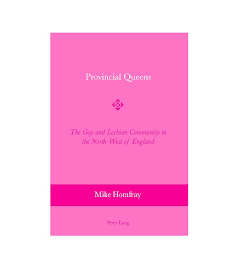Some interesting comments - here is the text
AUGUST Bank Holiday is all about civic festivals, and not just Mathew Street. Every year at this time, the call goes out: Liverpool needs its own Gay Pride celebrations.
This is inevitably accompanied by a wistful glance 33 miles east to Manchester, to compare the two cities in terms of their gay-friendliness or homophobia. The conclusion is often unfavourable to Liverpool, and issues like a local Pride, and a more high-profile, developed “gay quarter” are often viewed as ways of making improvements.
 | Liverpool is not Manchester, and even if there was a concerted effort to improve or promote Liverpool as a gay-friendly destination, with the policies to accompany it, the outcome would not be a clone of Manchester. And is that what anyone really wants? |
When these conversations begin, I often feel like the resident wet weekend (other than the one which will inevitably accompany the Manchester event), expressing doubts as to whether either of these things will really make any great difference.
Let’s start with Manchester's Gay Village. The “village” idea has always been more about hope than reality. It is essentially a commercial zone where there are selections of drinking establishments, most of which are owned by the major breweries, all of which are either gay-identified or gay-friendly. The old chestnut about the invasion of hen nights and tourists is well-worn and, given that barriers and entrance fees exist only for the duration of Pride, where gay people have to pay to enter “their” village, this is unlikely to change. There is a barbers, a taxi firm, a GP surgery, and a florist. But does this consist of a village – or simply a specific commercial district? And while, at least, the volume of drinking spaces does mean some variety, there is a clear tendency for a shift in at least some of Manchester’s lesbian and gay socialising towards the more cultural Northern Quarter, or suburbs such as Chorlton.
The Village was the product of particular circumstances. It emerged in a political climate where a combination of equality activism, sympathetic businesses, beneficial planning and regeneration initiatives, and a (pro-gay) city council wanting to take a pop at the (anti-gay) Tory government of the day came together at an opportune moment.
It is no coincidence that no other city has actually produced anything similar. The same reference points may be used – zones, villages, and so on – but Manchester’s Gay Village is a product of a particular time and place. It developed organically, and if Manchester was starting from scratch today in terms of creating a gay-friendly commercial zone, then I think it certain that the outcome would look nothing like the Gay Village. And the Village itself is not at all as some of the more visionary hopes for it at its outset.
So, when discussing Liverpool’s commercial gay scene, I would question whether the Village analogy is either helpful, or particularly useful. Liverpool is not Manchester: and even if there was a concerted effort to improve or promote Liverpool as a gay-friendly destination, with the policies to accompany it, the outcome would not be a clone of Manchester. And is that what anyone really wants?
Much the same can be said about Pride. In recent years, Gay Prides have been contracting rather than expanding, and with the many legal changes which have benefited gay, lesbian, bisexual and transgendered people, the initial reason for their existence has changed.
Gay Prides can be an exhilarating experience. My first Prides were in the late 80s, the days of Thatcher and Section 28, and they were times when there was clearly all to fight for. That hasn’t entirely gone away. Recent events have demonstrated that the issue of homophobic violence remains all too real, and the presence of people who are proud of and open about their sexuality has been and remains a vital element in combating this sort of threat.
But would a Liverpool Pride really assist this? The easiest sort of Pride to organise is the standard formula of “march followed by party in the park”. Sometimes the march ends up being abandoned altogether, or entirely overshadowed by the party. And is it really worth all the effort to provide a one day event where people can get pissed and dance to Kylie?

It’s almost as if that is typical of what gay and lesbian people do all the time – whereas I would argue that those who use the commercial scene regularly make up a small proportion of the gay population.
I’m not a party-pooper, and I have been to fantastic Prides in San Francisco and Amsterdam which are major events in those cities’ calendars for the whole community to enjoy. But given that Liverpool Pride isn’t going to be on that scale, I would question whether it is the best use of time, money and energy. Liverpool does have both a specific lesbian and gay film festival (Outsiders), and a yearly arts/cultural festival (Homotopia) and they are both things which few other cities have. Perhaps our energies might be better spent looking for and developing initiatives which won’t turn out to be pale copies of those which exist elsewhere.
And in doing this, local councils and other providers need to ensure that community development money and necessary support is provided to ensure that Liverpool and the rest of Merseyside becomes a genuinely inclusive and gay-friendly environment – and that means a far more profound cultural shift than simply creating pedestrianised commercial zones or single-day drink-fests.














1 comment:
A couple of raw and maybe relevant observations based on a study trip I helped with a few (well more like 5 or 6) years ago to Manchester and Liverpool. We called it 'A Tale of Two Cities' - right dead original title huh?
The most important lesson for me was that whilst my native Glasgow had suffered hugely from the whole post 1960 industrial decline scenario, I was gobsmacked by the extent and severity of the decline that Liverpool had gone through.
The second striking, and if I'm honest, unexpected lesson, was that many young people congregated in Liverpool at the weekends in preference, repeat in preference, to Manchester. Their consistant message was that Manchester was the scary place especially for young people and minorities with regard to gang trouble(Yardies, were the media's moral panic at that time).
A much more subjective impression I had was that there was more of an air of real street-level, just-do-it-man, culture around music, arts and creativity in Liverpool than I sensed in Manchester. Manchester gave off more of an air of being somehow deliberate and professional and self-conscious about it all.
I don't know how relevant or verifiable this is but there you are. By the way does anyone know what happened to Prof Greg Lloyd at Liverpool University? Much to the loss of the Scottish regeneration scene he moved to Liverpool University less than a couple of years ago. But when I recently tried to contact him I'm advised he is no longer there... that's now Liverpool's loss but I'd like to re-establish contact with him.
Post a Comment